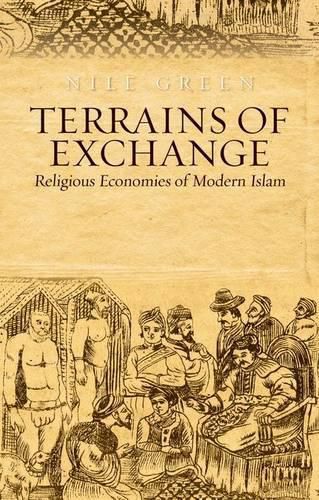Readings Newsletter
Become a Readings Member to make your shopping experience even easier.
Sign in or sign up for free!
You’re not far away from qualifying for FREE standard shipping within Australia
You’ve qualified for FREE standard shipping within Australia
The cart is loading…






Terrains of Exchange offers a bold new paradigm for understanding the expansion of Islam in the modern world. Through the model of religious economy, it traces the competition between Muslim, Christian and Hindu religious entrepreneurs that transformed Islam into a proselytising global brand. Drawing Indian, Arab, Iranian and Tatar Muslims together with Scottish missionaries and African-American converts, Nile Green brings to life the local sites of globalisation where Islam was repeatedly reinvented in modern times. Evoking terrains of exchange from Russia’s imperial borderlands to the factories of Detroit and the ports of Japan, he casts a microhistorian’s eye on the innovative new Islams that emerged from these sites of contact.
Drawing on a multilingual range of materials, the book challenges the idea that globalisation has given rise to a unified global Islam. Instead, it reveals the forces behind the fracturing of Islam in the hands of feuding and fissiparous ‘religious firms.
Terrains of Exchange not only presents global history as Islamic history. It also reveals the forces of that history at work in the world today.
$9.00 standard shipping within Australia
FREE standard shipping within Australia for orders over $100.00
Express & International shipping calculated at checkout
Terrains of Exchange offers a bold new paradigm for understanding the expansion of Islam in the modern world. Through the model of religious economy, it traces the competition between Muslim, Christian and Hindu religious entrepreneurs that transformed Islam into a proselytising global brand. Drawing Indian, Arab, Iranian and Tatar Muslims together with Scottish missionaries and African-American converts, Nile Green brings to life the local sites of globalisation where Islam was repeatedly reinvented in modern times. Evoking terrains of exchange from Russia’s imperial borderlands to the factories of Detroit and the ports of Japan, he casts a microhistorian’s eye on the innovative new Islams that emerged from these sites of contact.
Drawing on a multilingual range of materials, the book challenges the idea that globalisation has given rise to a unified global Islam. Instead, it reveals the forces behind the fracturing of Islam in the hands of feuding and fissiparous ‘religious firms.
Terrains of Exchange not only presents global history as Islamic history. It also reveals the forces of that history at work in the world today.